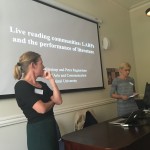The project Private Gains and Retailed Literature: pathways to an economics-based account of reading has just won FUSION funding for the coming semester. The project will ask why people consistently spend time and money on literature. What do they hope to gain? Since the opportunity costs are considerable, historically in terms of money and now in terms of time, readers must hope to gain something. On- and offline literature provides unique gains that have otherwise escaped investigation by English studies, which instead has preferred to think of meanings and literary achievement, rather than use.
In terms of finding a discourse to investigate this, it should be remembered that the publishing industry and its delivery of fiction is by necessity predicated on commerce, while the markets for published fiction make up part of commodity culture. The language of private gain, of benefit and loss, which is the heart of commodity culture, is well suited for thinking about general-market reading. And if we can get passed the hijacking of economics by neo-liberalism, or get past neo-liberal reductionism that converts everything to financial indices, we may admit that economics has something to say about the mechanisms of gain, and about a specific type of reading in that commodity-cultural context.
Headed by BU Senior lecturer in English, Dr Simon Frost, and in partnership with UNESCO Chair in New Media Forms of the Book, Prof. Alexis Weedon (University of Bedfordshire) and Prof. Claire Squires, Director of the Stirling Centre for International Publishing and Communication (University of Stirling), the project will be working with the JS Group/John Smith’s books to articulate in the language of cultural and media studies the role that books play in that international retail chain’s larger delivery of private gains. In addition, the project will conduct a student-led survey of the perceived benefits of retailed literature, across a number of UK book shops. Together, the student survey and JS study will greatly refine the project’s understanding of the qualities signified in book retail. It will help the project understand why people think books are important.
Theories of literary value based solely on intrinsic value are under extreme pressure these days. How can one argue for investment in the best literature in the face of severe cuts to essential public services? And who is to decide what is ‘best’ – that debate being trapped in the notion of cultural hierarchy. This project instead aims at an explanation based not on l’art pour l’art, nor on the education of readers towards a supposedly more-culturally discerning state, but on the benefits readers obtain from the books they currently have in hand; on the books they currently value.
Enquires should be directed in the first instance to
Dr Simon Frost, sfrost@bournemouth.ac.uk
 Reading Communities: Past and Present – AHRC conference, Senate House, London
Reading Communities: Past and Present – AHRC conference, Senate House, London










 REF Code of Practice consultation is open!
REF Code of Practice consultation is open! BU Leads AI-Driven Work Package in EU Horizon SUSHEAS Project
BU Leads AI-Driven Work Package in EU Horizon SUSHEAS Project Evidence Synthesis Centre open at Kathmandu University
Evidence Synthesis Centre open at Kathmandu University Expand Your Impact: Collaboration and Networking Workshops for Researchers
Expand Your Impact: Collaboration and Networking Workshops for Researchers ECR Funding Open Call: Research Culture & Community Grant – Apply now
ECR Funding Open Call: Research Culture & Community Grant – Apply now ECR Funding Open Call: Research Culture & Community Grant – Application Deadline Friday 12 December
ECR Funding Open Call: Research Culture & Community Grant – Application Deadline Friday 12 December MSCA Postdoctoral Fellowships 2025 Call
MSCA Postdoctoral Fellowships 2025 Call ERC Advanced Grant 2025 Webinar
ERC Advanced Grant 2025 Webinar Update on UKRO services
Update on UKRO services European research project exploring use of ‘virtual twins’ to better manage metabolic associated fatty liver disease
European research project exploring use of ‘virtual twins’ to better manage metabolic associated fatty liver disease